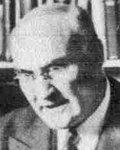|
* * *
HERMENEUTICS:
The Science of Interpreting the Scriptures
|
Study
earnestly to present yourself approved to God, a workman that does not
need to be ashamed, rightly dividing (Strong's: dissecting
correctly) the Word of Truth.
- 2 Timothy 2:15 - |
* * *
RULES OF
INTERPRETATION
Dr. David L. Cooper
Editor's note - In many places in the
Scriptures, the believer is encouraged to study the written Word as the
foundation for a holy, godly and fruitful life before God and man. But
how are we to study this unified, but daunting, compilation of sixty-six
books written by over forty authors between nineteen hundred and thirty-five
hundred years ago in languages and cultures that may be totally foreign to
us? Enter the science of hermeneutics.
To understand hermeneutical principles
is to be equipped for an intelligent study of the Word of God, tending
greatly to our approval before God as workmen that do not need to be
ashamed.
In our previous five Shofars, we've
been treated to sound instruction by Dr. David L. Cooper, founder of the
Biblical Research Society, in interpreting Scripture, a critical skill to
master, particularly in an age in which the Babel of interpretations is
legion. With "Rules of Interpretation," a study
in sixteen parts (introduction and fifteen section), we will commence what
will be our most extensive and detailed study thus far on the topic and
continue to hone our skills in rightly dividing the Word of Truth that we
might be a clear and accurate voice for the Lord. Let us apply ourselves.
*
* * |
|
*
* *
Introduction: Necessity For The Laws Of
Interpretation
ALL NORMAL intelligent individuals are able to speak and to express
themselves by means of language. In our association with others and in our
constant use of language, we seldom think of the laws, the basic principles,
involved in the speech which we are employing constantly.
Most people use language very loosely and lack accuracy of expressions. On
account of insufficient mental discipline and inattention to what others
say, we frequently misunderstand what is said. All too often we act upon the
misinterpretation of what is expressed and make mistakes. Just a moment's
consideration of these vital facts leads one to see the importance of our
knowing the basic principles of language.
There are reflected in our language the logical processes of the mind.
Psychologists tell us that there are certain definite fixed laws of the mind
according to which all normal persons think and act. Thus a document, the
expression of the working of an orderly mind, bears the imprint of the laws
of thought and can only be understood properly and adequately by one who
knows the normal, logical working of the mind. The importance of our knowing
these laws may be illustrated by the laws of nature in the material,
physical world. There are many laws governing the materials which are built
into an automobile. Among them are those governing the different metals
used; those controlling gases and the explosion of the same; and those
directing electrical energy. No manufacturer could produce an automobile
that would run and serve the purchaser, who does not understand all these
laws, and who does not conform his workmanship thereto. There are many laws
involved in the construction and the operation of the ediphone into which I
am now speaking. If something goes wrong with the electronic part of this
machine, it will not record what I am speaking. Then the repair man must
come out and make the proper adjustment in order that the machine may
operate normally. Language has definite, specific laws of thought that are
just as real as the laws governing physical matter. These must be
understood, therefore, if we are fully to enjoy the blessings of the
language which we are using, and which we are endeavoring to understand. I
may further illustrate this necessity by calling attention to the Greek. In
college and seminary I devoted seven years to the study of that language.
Since then I have been studying it. In fact, there are very few days which
pass during which I do not consult my Greek New Testament or the Greek
grammar. I have thus put thousands upon thousands of hours into the study of
the language, not only the words, but the syntax, and the various shades of
ideas that are expressed by the delicate shades of the grammar. I have done
this in order to get at the exact thought of the original, inspired writers.
No one can adequately understand the Greek New Testament or the Hebrew Bible
unless he is willing to study hard and long to master the principles of
those languages.
Our Bible has been translated by scholars out of the original Hebrew and
Greek into the English. The American Revised Version is probably the best
translation to date - although there are places where it can be improved. It
is the work of fallible men, and all men make mistakes. Nevertheless, it is,
in my judgment, the best we have. The English reader must study hard and
long if he is to get the real message of this excellent translation.
The Bible is God's revelation to man. We have every reason to believe that
not only the thoughts were inspired, but also the very words by which the
ideas were expressed in the original tongues were given infallibly by the
Spirit. Thus the sacred writers combined spiritual thoughts with spiritual
words. The Lord said exactly what He meant and meant just what He said. The
prophets and the Apostles spoke in the language of the people to whom they
ministered. At the same time their messages were poured into the moulds of
the thought forms of the messengers and those to whom they ministered. The
Lord had a very definite idea to convey whenever He made a statement. For
instance, let us read the first verse of the Scriptures:
In the beginning
God created the heavens and the earth. In the phrase
In the beginning,
the time element of the creation is given. God the Creator is mentioned in
the noun, the subject of the verb. What He did is expressed by the word,
created - the bringing into existence that which prior to the act, had no
form or substance. The heavens and the earth are the things that are said to
have been created in the beginning. This is one of the most profound
statements to be found anywhere. It is exact and definite. It is crystal
clear, so very much so that it refutes the basic assumptions of most modern
philosophies.
We could take any statement found in the Scriptures and see that it has a
definite, specific meaning. The purpose which we should cherish is to learn
exactly what is said, to arrive at the precise idea of the inspired writer.
Spiritual Requirements
The Bible is a spiritual book and must be spiritually discerned. The natural
man receives not the things of the Spirit; for he cannot understand them,
because they are spiritually discerned. There are therefore certain
spiritual qualifications which a person must possess if he is to understand
the revelation of God.
First and foremost, I would say that the first prerequisite is a person's
loving God. God made of one man every person to dwell upon the face of the
earth, having determined their appointed seasons and the bounds of their
habitations that they should seek God. All men have a thirst for God, though
it is generally perverted beyond recognition by inheritance and by one's
seeking pleasure in sin. Man's seeking his own pleasure is the result of
this perverted love of God and of man's ignorance. What he wants is
satisfaction, contentment, rest, joy. These can be found in God alone. The
soul of man was made and given capabilities and capacities so that he could
enjoy these blessings in communion and fellowship with God. But by the
introduction of sin and by wicked practices this inborn capacity for
appreciating God has become perverted. Man therefore seeks pleasure here and
there.
But the one who has followed the natural instinct in seeking after God, has
come to Him and found Him and has been born again, possesses a love for God
implanted in his soul. This supernatural affection may be cultivated by the
individual until he, like David, can say that his soul pants for God as the
hart does for the water brooks.
I can understand my wife and the things that she says and does better
possibly than anyone else. I love her with all my heart. I have associated
with her and known her actions and reactions to various situations. Thus
loving her and understanding her, I can evaluate a statement that she might
make or some action that she might perform better than anyone else. So it is
with the one who knows God and loves Him.
A second prerequisite to knowing God's Word is to will to do His will. The
Lord Jesus Christ said to certain Jews that, if anyone willed to do the will
of God, he would know of the teaching which he was then putting forth,
whether it was from God or from men (John 7:17). Anyone must come to the
point where he has made the will of God his will, if he is to enter into a
full appreciation of the revealed will of God. Our Lord Jesus said
constantly that He came not to do His own will but the will of Him who sent
Him. Thus He continued through prayer in communion and fellowship with God.
Another spiritual qualification is the laying aside of human theories and
the practices of men which are contrary to the will of God. In Isaiah 66:1-5
we have a prediction regarding the Jews who will rebuild the Temple and
reinaugurate the old Temple services and the Mosaic ritual.
In regard to these Isaiah, speaking for the Lord, said that they will have
chosen their own way and that their souls will have delighted in doing their
own abominations; He therefore declares that He will choose their delusions
and will bring their fears upon them. These men choose the things which they
will do and the things in which they delight. Thus they do not consider God
whatsoever in their plans and purposes. He therefore chooses their delusions
and makes them believe a lie. He then brings upon them the judgment of their
deeds.
Certain of the elders of Israel came to Ezekiel. Concerning them the Lord
revealed to the prophet that they were not really seeking the will of God,
but that they had taken their idols into their own hearts; yet they were
coming to him to inquire concerning the will of God. Concerning such people
the Lord made this revelation:
Every man of the house of Israel that taketh his idols into his heart and
putteth the stumblingblock of his iniquity before his face, and cometh to
the prophet; I Jehovah will answer him therein according to the multitude of
his idols; that I may take the house of Israel in their own heart, because
they are all estranged from me through their idols (Ezek. 14:4,5). Thus all
idols, of whatever type they may be, must be laid aside if one comes to
God - to His Word - in order to ascertain the real message from the Almighty.
Still another prerequisite for the understanding of God's Word is that each
person should pray to the Lord to open his eyes in order that he might see
the wonderful things in the Word. David had the revelation of God before his
eyes in the form of written documents. He was a brilliant man, but he
realized that the human mind must be illuminated by the Spirit of God in
order that it might know what is in the Word. The ordinary intellect can
grasp some of the facts that are lying on the surface of the Word; but David
was not satisfied simply with this superficial meaning of the Revelation.
What he wanted was to see the wonderful and the deep spiritual things of the
Word. He knew how he could be brought to see them. Thus he cried to the Lord
constantly to open his eyes that he might behold these wonderful things. The
Apostle Paul urged the church at Ephesus to pray that their spiritual
perception might be heightened in order that they might understand the great
spiritual realities which are ours in Christ.
I well remember when I learned this important truth. When my attention was
called to it, I began to pray for this spiritual insight. The first time I
uttered that prayer, the Lord enabled me to see things that I had never
observed before, neither had heard fall from any man's lips. In tens of
thousands of instances since that day I have asked Him to open my eyes to
behold these wonderful things. He always grants my petitions for further
light. I am not one of the Lord's pets, because He has none. Any of His
children who will come to Him and ask Him in faith to give them spiritual
insight into the Word will be heard, and the blessing will be
granted - provided they will use it to His glory and honor and to their
spiritual good. Let us therefore constantly ask Him to enable us to see the
wonderful things in the Word. As we learn them, let us put them into
practice and go forward in His cause.
Intellectual Requirements
We shall now turn to the intellectual
requirements that are necessary to the understanding of the Word. In the
first place let me call attention to II Timothy 2:15:
Give diligence to present thyself approved unto God, a
workman that needeth not to be ashamed, handling aright the word of truth.
The Apostle urged Timothy to give diligence to show himself approved unto
God, handling aright the Word of God. The King James Version says
study to
show thyself approved unto God. The translation found in the
Revised Version is of course the correct literal rendering. But a person may
handle aright or incorrectly the Word of God. If he handles it aright, or
holding
a straight course in the word of truth, he will, all things being
equal, get the real message of the Word. Paul himself believed in studying
the Word, even though he was an inspired apostle. He therefore urged Timothy
to bring the books, especially the parchments (II Tim. 4:13). Daniel, a
prophet of God, studied Jeremiah's prophecies and compared them with
the
books, probably the books of Kings and Chronicles. In doing this research,
the prophet was endeavoring to get at the meaning of the written Word. Let
us therefore study the Word in order that we might get its message.
The importance of this principle I may illustrate by the primitive Egyptian,
Babylonian, and Assyrian languages. Scholars went throughout the ruins of
Egypt and stood amazed before the hieroglyphics inscribed on the monuments.
They sought in every way to decipher these. All efforts
were in vain until
the Rosetta Stone was discovered, which afforded the key to this archaic
writing. Then scholars began to study and to translate it. Thus there has
been extracted from these unique records of Egypt the stories of the ancient
Pharaohs.
The old Babylonian and Assyrian monuments were as silent as the grave to us
moderns until Rawlinson copied the Behistun inscription, which afforded the
key to the old cuneiform writings. Since then scholars have mastered the
languages of these peoples and have read the stories of empires long buried
beneath the sands of the centuries. It took hard work on the part of these
scholars to ferret out the orthography and the grammar of these languages
long-dead. Faithful scientific study and toil always bring results.
Thus it is in the field of biblical study. There are certain fundamental
laws of biblical thought that must be mastered, if anyone is to understand
adequately the message of the Scriptures. Below I am giving the principal
laws of interpretation that will be discussed, the Lord willing, in this
series of articles:
I. The
First Step in Interpretation.
II. The Second Step in Interpretation.
III. The Golden Rule in Interpretation.
IV. The Law of First Mention.
V. The Law of Double Reference.
VI. The Law of Recurrence.
VII. A Play on Words.
VIII. An Analysis of Figures of Speech.
IX. The Avoidance of Extreme Literalism.
X. The Law of the Contexts of Quotations.
XI. Hebrew Parallelism.
XII. Interpretation vs. Application.
XIII. Symbolic Language.
XIV. Comparing Scripture with Scripture.
XV. Studying Obscure Passages in the Light of Plain Ones.
*
* *
Reprinted by
permission of the
Biblical Research Society,
where other
outstanding studies by Dr. Cooper may be accessed.

|


